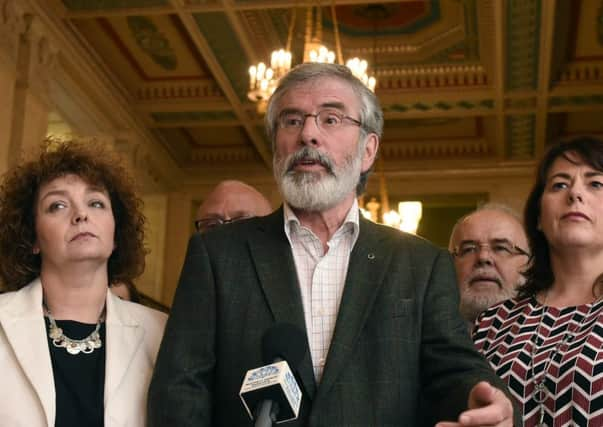Sinn Fein to meet Theresa May over DUP deal concerns


The meeting comes as sources suggested an agreement with the DUP to ensure the Conservatives can govern as a minority may not be finalised until next week, following the deadly blaze in a London tower block that has killed at least 12.
Treasury officials were also said to be working on the details of a deal that is expected to include additional investment for Northern Ireland.
Advertisement
Hide AdAdvertisement
Hide AdThe delay means the Queen’s Speech to present the government’s programme could be pushed back until the follow week.
Sinn Fein president Gerry Adams and the party’s Northern Ireland leader Michelle O’Neill will go to Number 10 for talks with Mrs May, with the Prime Minister also set to meet leaders from the SDLP, Ulster Unionists and Alliance Party.
It comes amid concerns the government will compromise its stated impartiality in the region if it enters a confidence and supply deal with the DUP at Westminster.
Sinn Fein, the SDLP and Alliance have all made clear Northern Ireland Secretary James Brokenshire cannot chair the ongoing process to restore power sharing at Stormont due to their perception he has a conflict of interest. Sir John Major has also urged caution.
The 1998 Good Friday Agreement commits the UK and Irish governments to demonstrate “rigorous impartiality” in their dealings with the different political traditions in Northern Ireland.
Sinn Fein’s Stormont leader Ms O’Neill said: “I will be making it very clear that any deal between the Tories and the DUP cannot be allowed to undermine the Good Friday and subsequent agreements.
“It’s imperative that both governments recommit to the word, spirit and implementation of the Good Friday Agreement if there is to be any prospect of re-establishing the executive.”
Advertisement
Hide AdAdvertisement
Hide AdShe added that “progress will not come from a deal between the DUP and Tories to prop up a government in Westminster with an austerity and Brexit agenda”.
Talks with the DUP to reach a confidence and supply deal securing the support of their ten MPs broke up on Tuesday night without an agreement, but Mrs May said the discussions had been “productive”.
A senior Conservative source told journalists: “We are making a lot of progress. It’s all being done in the spirit of co-operation, with a real focus on strengthening the union and providing stability at this time.”
DUP leader Arlene Foster, who travelled to Westminster for talks with the Tories on Tuesday, said she hoped a deal could be reached “sooner rather than later”.
The BBC reported DUP sources who said the talks were going well but it was thought “inappropriate” to make an announcement while events were unfolding at the Grenfell Tower in west London.
A Conservative source said there was so far no deal to announce and that a decision on the timing of any announcement would have to wait until an agreement was finalised.
Labour shadow business secretary Rebecca Long-Bailey said the prospect of a Conservative-DUP deal was “worrying”, telling BBC Radio 4’s Today programme: “It would create a lot of instability in terms of the peace process in Northern Ireland.”
Meanwhile, Mrs May came under further pressure to change her approach to leaving the European Union, with predecessor David Cameron among those suggesting a softer stance with a greater effort to seek a consensus.
Advertisement
Hide AdAdvertisement
Hide AdBrexit talks are set to start in Brussels on Monday. The former prime minister said Mrs May would have to change her approach to Brexit as a result of the election, warning: “It’s going to be difficult.”
At a conference in Poland, Mr Cameron urged the Prime Minister to “consult more widely with the other parties” on how to achieve Brexit, echoing calls from other senior figures in the Conservative Party including Scottish leader Ruth Davidson.
“There’s no doubt that there is a new player on the stage,” Mr Cameron said of Ms Davidson’s stance. “Scotland voted against Brexit. I think most of the Scottish Conservatives will want to see perhaps some changes with the policy going forward.”
Mr Cameron added that he thought there would be “pressure for a softer Brexit” and that Parliament now “deserves a say” on the issue.
At a joint press conference with Mrs May in Paris on Tuesday night, French president Emmanuel Macron suggested that the door was still open for the UK to remain within the European Union if it changed its mind.
“Until the negotiations come to an end, of course there is always the possibility to re-open the door,” said the French president.
But the European Parliament’s Brexit co-ordinator Guy Verhofstadt said the UK could not expect the conditions of its membership to remain the same if it took this path. Speaking in Strasbourg, he said the £5 billion a year EU budget rebate negotiated by Margaret Thatcher in 1984 could be up for grabs if Britain decides to stay.
Advertisement
Hide AdAdvertisement
Hide Ad“Yesterday Emmanuel Macron... said if Britain is changing its mind, it will find an open door,” said Mr Verhofstadt. “I don’t disagree with him. But like Alice In Wonderland, not all doors are the same. It will be a brand new door with a new Europe.”